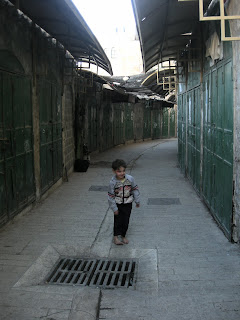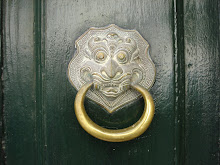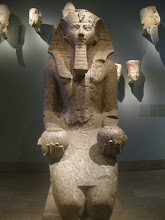Wednesday, January 27, 2010
Israel's Apartheid Wall, Again
Tuesday, January 26, 2010
Don't Forget Gaza
Meanwhile, hundreds of thousands of people in Haiti don't even have a bed anymore. And families in Gaza, just a little more than two hours away from me, live in makeshift tents since the Israeli war one year ago. The continued siege makes it impossible for Gazans to rebuild their homes: borders are sealed and building materials aren't let through. Pending some kind of solution, their roof and walls are made out of blankets and plastic sheets, and their floor is mud.
Yes, mud. The rain storms have drenched the refugee camps in water. Temperatures drop to or even below zero at night.
And I lie in my bed with the heater on. I lie there with these images before my eyes (follow link, and click on the picture to see more). I'm going crazy with guilt. What am I doing to change any of this? How can I go on when I know that this is happening so close to me?
We mustn't abandon Haiti. Nor Sudan, Congo, Iraq, Pakistan, Somalia, Afghanistan, or any other place in the world where there are displaced people who had to flee from their homes, had their homes destroyed, don't have a roof over their heads or access to the basics in life. And we can't forget about them as soon as the media stops reporting about them because there is a new conflict, or a new earthquake or flood. Just like we can't forget about Gaza.
Sunday, January 10, 2010
Israeli Settlers


Friday, January 8, 2010
Check Point Anecdote of the Day
Tuesday, January 5, 2010
It's the Kids



Monday, January 4, 2010
Christmas Day in Bethlehem, or The Day I (sort of) Met Abu Mazen
We squeezed ourselves past the crowd into the Church of Nativity and decided not to wait in line for hours and hours to see the actual birthplace of Jesus downstairs (perhaps not very surprisingly, Christmas Day brings hundreds and hundreds of people to his birthplace), but pushed through into the newer part to attend the last few minutes of Christmas Day Mass.
There is something immensely beautiful about Catholic/Orthodox Christian chanting.
After Mass, we stopped on Manger Square on our way to have Christmas Hummus (the hummus in Bethlehem is amazing!), and attended the last few minutes of the Muslim Friday midday prayer. The Square was absolutely hushed as hundreds of men and boys gathered outside the mosque to pray. We stood behind them and watched solemnly.
Then Abu Mazen--the Palestinian President Mahmoud Abbas--made his way out of the mosque together with the son of Libya's leader Gaddafi, Saif Al-Islam. The Square was still hushed. Tarek had squeezed his way to Abu Mazen's car with my camera, and I was squashed in between a bunch of men a little behind him. Then, right before he got into his bullet proof car, Abu Mazen smiled, put his hand up and waved to us (mainly to Tarek, but the others thought it was to them), and the crowd went crazy and started whistling and cheering.
 Mahmoud Abbas on Manger Square
Mahmoud Abbas on Manger SquareWe took our Israeli friends to Aida Refugee Camp and I started crying. But more about that in my next blog post.
Share
Christmas Eve in Bethlehem


Friday, January 1, 2010
How to Extend Your West Bank Visa
Most people I know who work or volunteer in the West Bank think it’s impossible to extend their visa after the first three months have come to an end. So they go to Jordan or to Egypt for a week, and come back. Some of them aren’t allowed back in. Others get a two-week visa. Some get another three months, and then have to go over the same procedure again in three months.
But there is another way, regardless of what Israeli or Palestinian authority people say. I got an extended visa for one year, and I’ll tell you exactly how:
I got papers from the Palestinian Ministry of Interior in Ramallah. On the fifth floor, there’s a small office for visa matters for foreigners. Go there and ask what you need to fill out. You will also have to pay a small fee—140 shekels at the Ministry, and 140 shekels in Amman Cairo Bank (be sure to get a receipt).
I got a work contract for one year from my employer—a Palestinian NGO working in the West Bank. In order not to get a West Bank Only visa, I made sure to write in my contract that my work includes frequent travels to Jerusalem.
Then, thinking it would help to have an international organization saying I work with them, I got a letter from one of our American donors in Jerusalem saying that they cooperate with my NGO, and that I work on projects with them.
Finally, my boss wrote a short letter stating that I’ve been offered this position, and I will work with this American partner organization, and I will have to travel to Jerusalem for work.
The Ministry of Interior sent all my papers, plus two recent photos of me, and my passport to the Israeli authorities in Beit-El.
It took me two days before I got my passport back, with a visa for one year for all of Palestine—both the West Bank and Israel.
I got a single-entry visa, but it is possible to apply for a multi-entry visa as well. You have to specify this when you apply. A multi-entry visa is a little more expensive to apply for, and I have no idea how easy or difficult it is to actually get it.
All I know is that it is possible to extend your visa without having to go through the hassle of going to Jordan and come back.































